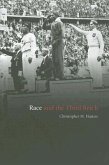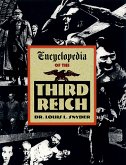The Nazi regime condemned psychoanalysis as "Jewish" and a threat to the state's ability to control the individual. Yet other forms of psychotherapy--Jungian, Adlerian, and numerous independents--were allowed not only to survive under Hitler, but to establish a full-fledged institute funded by the German Labor Front, the Luftwaffe, and the Reich Research Council. In this, the first study of psychotherapy in the Third Reich, Geoffrey Cocks examines how psychotherapists were able to continue to practice under Hitler, the political conditions that made the establishment of the Göring Institute possible, and the extent to which psychotherapists adhered to Nazi dogma. Based on interviews with surviving members of the Institute as well as extensive primary research, the book tells, for the first time, the full story of the Göring Institute and considers the morally ambiguous place it holds in the evolution of German medical psychology.
Hinweis: Dieser Artikel kann nur an eine deutsche Lieferadresse ausgeliefert werden.
Hinweis: Dieser Artikel kann nur an eine deutsche Lieferadresse ausgeliefert werden.








